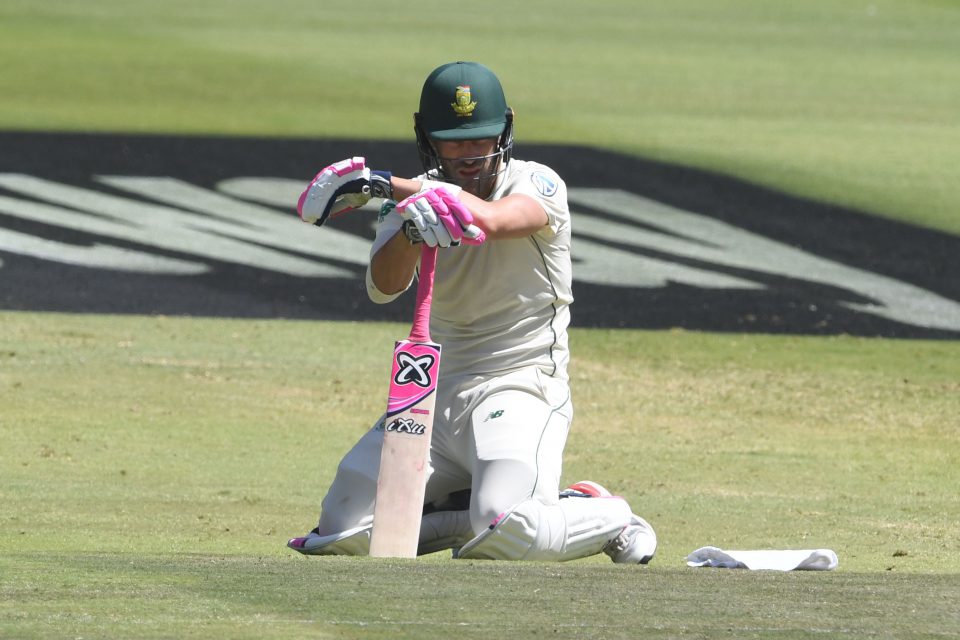Where to from here for the Proteas?
England humbled the Proteas on home soil with a 3-1 Test series victory. The poor SA performance reflected political turmoil off the pitch, but there are signs that they can bounce back.
Author:
1 February 2020

As South Africa and England shared a beer to mark the end of their four-match Test series at the Wanderers in Johannesburg, it would have been easy for the home side to look across the room and indulge in a touch of self-pity.
England, the world champions, are on an upward trajectory and aiming to become more than just middle-of-the-road in Test cricket. They are led by a captain who is emboldened by each series, especially away from home, and they have a decisive plan about where to go next.
To say they are in a good place is to state the blindingly obvious.
Young players are emerging in the side and fast becoming part of a pack of solid performers. England have a thrash of fastbowlers, skilful veterans who are passing on their knowledge and the world’s most complete cricketer in Ben Stokes.
They have a central contract system so flush that several of their players are content to be purely red-ball specialists. And those numbers can only swell with the clout that a World Cup trophy brings to the broadcasting negotiation table.
They have different captains for different formats, each well aware of the expectations that come with holding that office but also with enough downtime to manage the tasks at hand. There is an unquenchable passion for the game in the stands and streets, and the England and Wales Cricket Board even has deep enough pockets to consider lavish ideas like The Hundred.
Related article:
In contrast, South Africa have been on a depressingly grim trajectory, with their fortunes in Test cricket plummeting to previously unimaginable depths. The runs, like the money, have dried up and there has been a gargantuan withdrawal from the experience bank the team used to draw from at will.
It has been a summer of humble pie and a nation wincing as the Barmy Army took over most of the cricket grounds and celebrated deep into January at the expense of the Proteas. The lessons have also come thick and fast on the field, as many domestic bullies and hopefuls got their noses bloodied on the uncompromising playground that is international cricket.
Replacing veterans
As it has always been, the leap from domestic to international is vast. Some players, particularly batsmen, have to go back and correct deficiencies before resuming their careers.
Proteas captain Faf du Plessis has admitted that it is tough for young players to come into an environment where the team is struggling and senior players such as himself are not making nearly enough runs to help newcomers settle.
“We are at the start of a new generation. It’s a pretty new team and you have to allow people to settle into positions,” warned the retiring Vernon Philander.
His departure is the latest on the growing list of players of his generation who are leaving the game. It is inevitable. But in Philander, South Africa have lost the expert who could pick top-order locks. They have also lost an underrated team player, one who bristled at opposition and defended the honour of his side at every turn. He embodied the buffalo that coach Mark Boucher spoke of at the start of the series, wounded though he was by the end.
Related article:
Before Philander, Dale Steyn, AB de Villliers, Morne Morkel, JP Duminy and Hashim Amla retired or turned to short-term gigs on the international Twenty20 (T20) circuit. That is half a team and some of the greatest names the game has ever seen, across all generations.
They were the poster boys for South African cricket and with their individual departures acknowledged in isolation, the collective impact was perhaps not fully recognised. The South African dressing room, once so certain of itself on a cricket field, is having to find its feet again, its batting grit and bowling grunt replaced by whimpers and woe.
Time to rebuild
It is difficult to replace that quantity of quality overnight. Du Plessis pointed out that this was not a situation unique to South Africa. Rivals have gone through similar periods and had to take the time to rebuild.
“It wasn’t too long ago that newspapers in Australia were saying that theirs was the worst Australian side in history. England’s ODI [one-day international] team also had to rebuild,” said Du Plessis.
These things are cyclical. To start the process of getting back to something like a time when South Africa went nine years unbeaten on the road, the Proteas need to take a long hard look at how they are going about things.
“We South Africans are pretty quick to criticise. There’s a lot of young players in the team and we’ve got to allow them time to settle in,” said Philander of his successors.
He’s right. These things take time to fix. But where to start?
Strong leadership is needed. That wasn’t apparent when the wise men in the dressing room offered novice Anrich Nortje to the media, on a day when there were yet more questions about the team’s batting frailties.
It was unfair and a dereliction of duty by the men appointed for their experience in all departments, including answering tough questions about their rebuilding mission.
On the field, the franchise system is what it is. Some bemoan its quality, but that is owing to a high number of premature Kolpak swallows, the lack of a domestic cricket culture within the national team and a massive emphasis on white-ball cricket.
Lost aura of invincibility
The best times for South African cricket after readmission centred on a quality Test side, one that was tough to beat at home and away. The obsession with trying to win a World Cup has forced their eyes off the red ball and the consequences of that misdirection are showing at all levels of the game.
It is time to go back to basics and start creating dedicated cricketers who want to bat or bowl all day for their country, cricketers like Nortje and Rassie van der Dussen, who have shown that all is not lost.
These two players had to wait for their shot at the big time and presumably don’t intend wasting it. Nortje provides his captain with speed and heart, vital ingredients in a fastbowler. At the Wanderers, he started shaping the ball beautifully away from the batsmen, displaying the skills he is acquiring all the time.
In Van der Dussen, South Africa has a leader of men. He seems to find an answer for most questions asked of him at the highest level and must now surely be a candidate for the Test captaincy. He didn’t get a deserved century at his home ground in the final Test, but he displayed enough skill and courage to show that he is now a vital part of the side.
Related article:
South African cricket could do a lot worse than handing Van der Dussen a captaincy role in one of the formats. Quinton de Kock has the ODI captaincy and likely the T20 leadership role by year’s end, but overburdening him with responsibility could easily dull his naturally explosive instincts.
Du Plessis has looked more and more jaded in recent months. The weight of responsibility and wait for runs are not comfortable bedfellows. Add a team in transition and it is no wonder that questions about his future have grown ever louder.
Some cited his spat with the English team, just before he was dismissed, as a sign that he was a man raging against the tide. Du Plessis has always been combative on the field, but respectful and respected off it.
He was generous in his praise of the English and resolutely frank about his own form and his team’s fortunes. Happily, he was also seen sharing a drink and a chat with Jos Buttler and several other English players by the end of the night, showing that what happens on the field can actually stay out there.
How much more he has in his emotional tank will soon reveal itself, but South Africa would do well to hold on to him for as long as possible. It is no easy task to set a ship’s path when it is in the midst of a storm and has no rudder. But that is the task at hand.
Battling with spin
A new strategy has to be implemented for spin. This team’s current approach towards it is laughable. South Africa have been shipping spin camps to India for much of the past decade, but the results show that they are going backwards rather than improving.
They need to can them and get some strong mentors to assist on home soil. India have long stopped coming to these shores for pace-bowling clinics. They have addressed their issues at home. And the money is simply not there for South Africa to indulge in these expensive missions of hope.
Hundreds of millions are being spent on development, but the returns have been underwhelming. There has to be a better way to get more talent to the top. Lip service is not the way, and the lack of accountability in the lower ranks of South African cricket is startling.
Related article:
Despite all the problems, there is still the belief that South Africa can find its way again. Joe Root had been hitherto reluctant to speak on South African matters. But with the series over, the English captain provided his assessment of his opponents.
“I can see South Africa turning things around very quickly, because they have some very talented individuals, and a very strong management group that are very experienced and know the game very well,” he said.
Clarity required
As much as the Proteas have to improve for themselves, world cricket needs a strong South Africa, too. The game is increasingly divided into two lots: India, England and Australia basically run the game and then there’s the rest of the cricketing world. South Africa are somewhere in the middle, hoping the Big Three might remember that they used to be a Big Four.
Asked what had worked for his own players, who have become accomplished tourists, Root’s response was simple: “When you’ve got a group of players working towards something, under clear instruction, it makes things a lot easier.”
Clarity is what South Africa need. Clarity in role and accountability, and clarity when it comes to the future. There is a lot going on off the field, but cricketers are paid to play. They must shut out the noise and put their heads down come winter.
The West Indies await in July and all those concerned with South African cricket will hope that the Test team is not left marooned on the islands, still looking for answers after that tour. It is a chance to embark on a new voyage and hopefully set the compass towards fresh plunders elsewhere in the world. Before they set sail for the Windies, though, the ship needs a rudder. And maybe a few new hands on deck.




